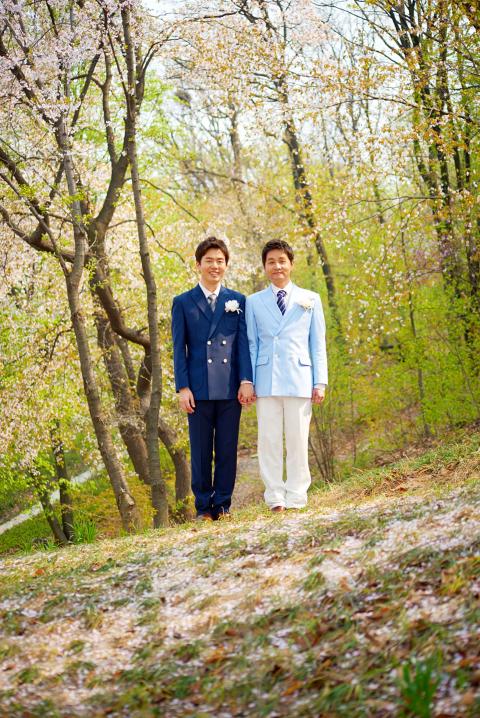Queers, sinners and Charlie Chaplin are among the characters featured in the International Queer Film Festival (台灣國際酷兒影展) and the Kaohsiung Film Festival (高雄電影節), both of which open today in Taipei and Kaohsiung.
Though only in its second year, the Queer Film Festival has ambitiously formed a pan-Asian platform to connect filmmakers, curators and other professionals throughout Asia. Family, aging, relationships, religion and HIV/AIDS are among the topics the festival explores through film.
The Kaohsiung Film Festival celebrates its 15th anniversary with the spotlight on comedy, particularly the comedies of Chaplin, who humorously tackles class consciousness and oppression.

Photo courtesy of Taiwan International Kaohsiung Film Festival
QUEER FILM FEST HIGHLIGHTS
Now in its second year, the festival, which has a lineup of close to 100 films, begins in Taipei and will then travel throughout the nation.
In I am Michael, the issue of gay rights issues is dealt with through the story of an outspoken gay rights activist, commendably played by James Franco, who denounces his homosexuality as a sin and becomes a Christian pastor.

Photo courtesy of Taiwan International Kaohsiung Film Festival
Though some say the film casts gay people in a negative light, director Lin says it presents an evenhanded portrait of a conflicted man struggling to reconcile his religion and sexuality.
Filmmaker Parvez Sharma courageously makes himself the subject of his documentary, Sinner in Mecca, to examine what it means to be gay in the Islamic world. Sharma documents his pilgrimage to Islam’s holiest site and seeks greater truth from his faith amid the politics, violence and patriarchy of Saudia Arabia, where being gay is punishable by death.
Older gay audiences may find emotional resonance in Boulevard, which stars Robin Williams as a married man whose family life unravels after he meets a young male prostitute.

Photo courtesy of Taiwan International Queer Film Festival
MAKING CONNECTIONS
This year, organizers established the Asian-Pacific Queer Film Festival Alliance. Thirteen organizations from 10 countries have joined, and festival directors from nine cities, including Seoul, Tokyo, Beijing, Yangon, Jakarta and Manila, will come to Taipei during the festival to celebrate the launch of the alliance and set up a framework for future collaboration.
Festival chairperson and co-director Jay Lin (林志杰) says the alliance allows members to pool their resources, necessary because LGBT events in Asian countries are often in need of support and funding.

Photo courtesy of Taiwan International Queer Film Festival
“Most [LGBT] movies come from the West. We would like to see more Asian stories told on the big screen,” Lin says.
Through collaboration, participating festivals can support each other with programming and international co-productions.
Lin cites the gay-themed, coming-of-age drama How to Win at Checkers, as an example.
The project began as a 10-minute documentary set in Bangkok, but later Korean-American director Josh Kim raised enough international funding to expand it to a feature-length film with an all-Thai cast.
The film has been chosen as Thailand’s submission to next year’s Academy Awards for best foreign-language film.
Lin says the aim for next year is to enable more LGBT movies to be made by Taiwanese filmmakers, a goal he hopes to achieve through workshops led by filmmakers such as Stanley Kwan (關錦鵬), Nelson Yeh (葉天倫) and Arvin Chen (陳駿霖).
“We can also use the alliance as a platform to launch all these made-in-Taiwan content to other festivals in Asia,” Lin adds.
SHORT FILMS AND IN THE CLOUD
Some of the films at the Kaohsiung festival will be available through KFF Cloud Cinema for NT$180 (雄影雲端戲院) on Google Play and the App Store, enabling users to gain access to more than 100 short films during the festival period.
Selected films include rarely seen shorts by David Lynch, German filmmaker Veit Helmer and James Cunningham from New Zealand, as well as the 66 nominated works at this year’s international short film competition.
For those who prefer the brick-and-mortar event, organizers put together a rich lineup of over 200 feature, documentary, animated and short films to be screened at three venues in the harbor city.
In addition to the four digitally restored classics by Chaplin, audiences will have a change to see past comedy gems, including Monty Python and the Holy Grail (1975), Back to the Future (1985) and The Fisher King (1991).
On the side of wacky genre flicks and B movies that the festival is known for, Japanese cult director Takashi Miike’s latest offering, Yakuza Apocalypse, combines Japanese gangster and vampire genres. Green Room is a gory thriller about a young punk rock band pitting against a gang of neo-Nazis led by a white supremacist played by Patrick Stewart.
From the documentary realm, The Wolfpack proves that truth is stranger than fiction as filmmaker Crystal Moselle reportedly spent four years following the lives of a clan of seven children, now fully grown, who were locked away by their controlling father for their entire childhood in a New York City apartment. Their only access to the outside world was through watching the 5,000 movies collected by their film-buff dad.
For this year’s music concert, which has become a highly anticipated fixture of the festival, the Kaohsiung Symphony Orchestra (高雄市交響樂團) has been invited to perform during the screenings of Chaplin’s City Lights at Da-Dong Cultural Center on Oct. 31 and Nov. 1. For more information, go to the event’s bilingual site at www.kff.tw.
FESTIVAL NOTES
WHAT: Taiwan International Queer Film Festival (台灣國際酷兒影展)
WHEN AND WHERE: Today to Nov. 1 at Taipei Shin Kong Cinemas (台北新光影城), 4F, 36, Xining S Rd, Taipei City (台北市西寧南路36號4樓), Nov. 2 to Nov. 7 at Wonderful Cinemas (萬代福影城), 38 Gongyuan Rd, Taichung City (台中市公園路38號), Nov. 13 to Nov. 22 at Oscar Digital Theatre (奧斯卡數位影城), 287 Renjhih St, Kaohsiung City (高雄市仁智街287號) and MLD Cinema (高雄MLD影城), 8 Jhongcin St, Kaohsiung City (高雄市忠勤路8號)
ADMISSION: Weekday matinee screenings (before 6pm) cost NT$160 and weeknight and weekend screenings are NT$180, NT$90 for senior citizens aged 65 and up and people with disabilities. Tickets are available through FamilyMart (全家) FamiPort kiosk and at www.famiticket.com.tw
ON THE NET: www.tiqff.com
FESTIVAL NOTES
WHAT: Kaohsiung Film Festival (高雄電影節)
WHEN: Today through Nov. 8
WHERE: Kaohsiung Film Archive (高雄市電影館), 10 Hesi Rd, Kaohsiung City (高雄市河西路10號), Da-Dong Cultural Center (大東文化藝術中心), 161 Guangyuan Rd, Kaohsiung City (高雄市光遠路161號), and Kaohsiung Main Public Library (高雄市立圖書館總館), 61 Singuang Rd, Kaohsiung City (高雄市新光路61號)
ADMISSION: Tickets are NT$180 per screening, NT$500 and NT$700 for the music concerts, available through www.ipasskhcc.tw
ON THE NET: www.kff.tw

April 14 to April 20 In March 1947, Sising Katadrepan urged the government to drop the “high mountain people” (高山族) designation for Indigenous Taiwanese and refer to them as “Taiwan people” (台灣族). He considered the term derogatory, arguing that it made them sound like animals. The Taiwan Provincial Government agreed to stop using the term, stating that Indigenous Taiwanese suffered all sorts of discrimination and oppression under the Japanese and were forced to live in the mountains as outsiders to society. Now, under the new regime, they would be seen as equals, thus they should be henceforth

Last week, the the National Immigration Agency (NIA) told the legislature that more than 10,000 naturalized Taiwanese citizens from the People’s Republic of China (PRC) risked having their citizenship revoked if they failed to provide proof that they had renounced their Chinese household registration within the next three months. Renunciation is required under the Act Governing Relations Between the People of the Taiwan Area and the Mainland Area (臺灣地區與大陸地區人民關係條例), as amended in 2004, though it was only a legal requirement after 2000. Prior to that, it had been only an administrative requirement since the Nationality Act (國籍法) was established in

With over 80 works on display, this is Louise Bourgeois’ first solo show in Taiwan. Visitors are invited to traverse her world of love and hate, vengeance and acceptance, trauma and reconciliation. Dominating the entrance, the nine-foot-tall Crouching Spider (2003) greets visitors. The creature looms behind the glass facade, symbolic protector and gatekeeper to the intimate journey ahead. Bourgeois, best known for her giant spider sculptures, is one of the most influential artist of the twentieth century. Blending vulnerability and defiance through themes of sexuality, trauma and identity, her work reshaped the landscape of contemporary art with fearless honesty. “People are influenced by

The remains of this Japanese-era trail designed to protect the camphor industry make for a scenic day-hike, a fascinating overnight hike or a challenging multi-day adventure Maolin District (茂林) in Kaohsiung is well known for beautiful roadside scenery, waterfalls, the annual butterfly migration and indigenous culture. A lesser known but worthwhile destination here lies along the very top of the valley: the Liugui Security Path (六龜警備道). This relic of the Japanese era once isolated the Maolin valley from the outside world but now serves to draw tourists in. The path originally ran for about 50km, but not all of this trail is still easily walkable. The nicest section for a simple day hike is the heavily trafficked southern section above Maolin and Wanshan (萬山) villages. Remains of